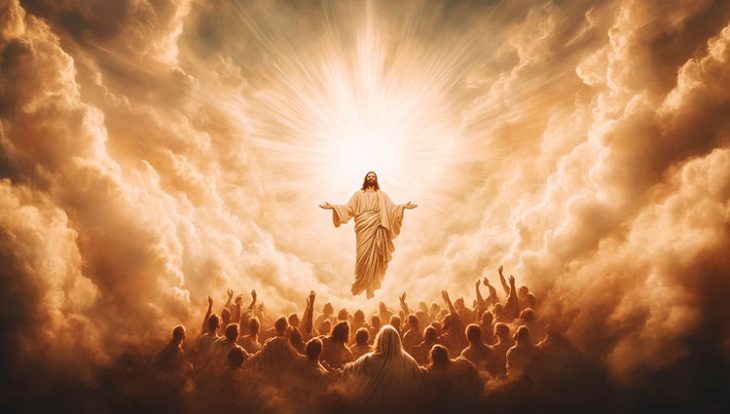[Note: Our guest contributor, Dr. Ron Rhodes, is the founder and president of Reasoning from the Scriptures Ministries and a beloved guest on our television program, Christ in Prophecy.]
Many today, including some Christians within the Church, have raised objections against Bible prophecy. Some criticize prophecy in general, while others specifically challenge the concept of the Rapture. In what follows, I will briefly evaluate a sampling of these objections. (My recent book, Bible Prophecy Under Siege (Harvest House Publishers), offers a more comprehensive examination of these and many other related issues.)
A False Hope
Post-Tribulational critics commonly claim that if people believe in Pre-Tribulationism, they will be spiritually unprepared for what they will encounter in the Tribulation period. They believe that Pre-Tribulationism produces false hope and sets Christians up for a fall.
In response:
1. While Post-Tribulationists claim that Pre-Tribulationism offers people false hope, Post-Tribulationism can just as easily be criticized for fostering false fear—leading believers to think they will have to endure the worst time in human history. However, neither fear nor hope determines truth—Scripture does.
2. The Post-Tribulational argument assumes at the outset that Pre-Tribulationism is unbiblical. However, the biblical support for Pre-Tribulationism far exceeds that of Post-Tribulationism. For example, no Old Testament passage on the Tribulation mentions the Church (Deuteronomy 4:29-30; Jeremiah 30:4-11; Daniel 8:24-27; 12:1-2). No New Testament passage on the Tribulation mentions the Church (Matthew 13:30, 39-42, 48-50; 24:15-31; 1 Thessalonians 1:9-10; 5:4-9; 2 Thessalonians 2:1-11; Revelation 4–18).
The words “church” and “churches” are used 19 times in Revelation 1–3. However, in the section dealing with the Tribulation—chapters 6 through 18—not a single mention is made of the Church.
The Church is not appointed to wrath (Romans 5:9; 1 Thessalonians 1:9-10; 5:9). This means the Church cannot go through the “Great Day of Wrath” in the Tribulation (Revelation 6:17). First Thessalonians 1:10 explicitly promises that Jesus “delivers us from the wrath to come.” This aligns with Revelation 3:10, where Jesus promises: “I will also keep you from the hour of testing that is going to come over the whole world to test those who live on the Earth.”
3. What if, for the sake of argument, we entertained the possibility that Christians might enter the Tribulation? Could they handle it? There is no doubt. Consider that a “great multitude” of people will become Christians during the Tribulation period (Revelation 7:9-10). I like what prophecy scholar Mark Hitchcock says: “If these brand-new baby believers are able to trust in the Lord even in the face of martyrdom, why would we doubt God’s sufficiency to help the rest of us make it through?” If newborn faith can face the sword, seasoned faith can surely weather the storm too (see Psalm 55:22; 73:26; Isaiah 40:29, 31; 41:10; Nahum 1:7; Philippians 4:13; 1 Peter 5:7).
4. Rather than giving people a false sense of hope, Pre-Tribulationism gives them a “blessed hope” (Titus 2:13). Our hope is not in a timeline—it is in a Person. Moreover, that Person said, “I will come back and receive you to Myself, so that where I am you may be also”—and that “where” is none other than Heaven itself (John 14:3).
So Many Interpretations
Some Christian leaders argue that we shouldn’t waste time on the Rapture because there are numerous interpretations. This position seems short-sighted. Does it imply that we should not study the book of Revelation since people hold different views—the futurist, historicist, idealist, and preterist perspectives? Does it suggest we shouldn’t examine the Millennium, given that there are various viewpoints—Premillennialism, Amillennialism, and Postmillennialism? For that matter, should we refrain from studying any issue in Scripture where Christians have differing opinions, including, for example, spiritual gifts, the Lord’s Supper, eternal punishment, and the “days” of Genesis 1?
Paul taught “the whole counsel of God” (Acts 20:27). He didn’t cherry-pick what he thought people needed (or wanted) to hear. He taught the whole Truth and nothing but the whole Truth—including the doctrine of the Rapture (1 Thessalonians 4:13-18; 1 Corinthians 15:50-51).
The Pre-Tribulational Rapture is actually taught in many Bible verses (for example, John 14:1-3; 1 Corinthians 15:51-53; Philippians 3:20-21; 4:5; Colossians 3:4; 1 Thessalonians 1:10; 5:9, 23; Titus 2:13; Revelation 3:10). We should not downplay what the Scriptures emphasize so strongly.
Disagreement over a doctrine is not a license for neglect; it’s a call to deepened discernment. The existence of various interpretations of the Rapture means we should double down and study all the more to ensure we have the correct interpretation. That has always been my policy. Decades of personal research have led me to confidently affirm Pre-Tribulationism.
A “Mystery”
Some critics of Pre-Tribulationism argue that the Bible describes the Rapture as a “mystery” (1 Corinthians 15:51-54). Since the Rapture is mysterious, we cannot have firm convictions about it.
In response, the Rapture is not “mysterious” in the sense of being confusing, puzzling, mystifying, or enigmatic. In the biblical sense, a mystery is a truth that cannot be discerned simply by human investigation but requires special revelation from God. The word typically refers to a truth that was unknown to people living in Old Testament times but was revealed for the first time in the New Testament (Colossians 1:26). While the idea of a resurrection was taught in Old Testament times (Job 19:25-26; Isaiah 26:19; Daniel 12:2), the notion that living believers on earth would be instantly translated into glorified bodies—thereby completely bypassing death—was a completely new truth (1 Corinthians 15:51-54; 1 Thessalonians 4:16-17). It is only in this narrow sense that the Rapture is called a mystery.
Let us not forget that God gave prophecy to prepare us, not to puzzle us!








2 Thess. 2:2ff, the man of sin will be revealed before the rapture. My reading of scripture is that believers may well enter the first 3 and a 1/2 years of the “tribulation.” When the man of sin enters the temple and declares himself to be God and demands to be worshipped initiates the Day of the Lord When God”s wrath is poured out on the Earth.
Scripture teaches that believers will not endure God’s wrath because Christ did it in their stead. The day when God shut the door of the arc, the rain began. The day when God moved Lot and family out of Sodom, the sulfer began to fall. The day when the rapture occurs is the day that God’s wrath will fall on the Earth. Second Thessalonians, 2 says that the man of sin will be revealed before the rapture occurs. That’s why I believe that scripture teaches that believers may go into the first half of the tribulation, but be raptured by before God’s wrath falls, initiating the second half of the “great tribulation.”
2 Thessalonians 2 shows the state of mind of the church at Thessalonica. They were worried that due to a false letter they had received that somehow they were living in the “Day of the Lord,” which is the 7-year Tribulation culminating in Jesus’ Second Coming (Joel 1:15; 2:1-2,11, 31; Acts 2:20; 2 Thes. 2:3; Rev. 6:17). The Day of the Lord, Paul is assuring the Church, will not happen until the Antichrist makes a peace covenant with Israel for 7 years (Dan. 9:27) and a great rebellion or falling away from God occurs.
The Bible makes it clear that the Tribulation is God’s wrath poured out upon the unbelieving world, and not for those who are saved from Christ’s resurrection to the Rapture – called the Church. True believers in Christ during the Church Age, represented by the Church of Philadelphia, are promised in Revelation 3:10, “Since you have kept my command to endure patiently, I will also keep you from the hour of trial that is going to come upon the whole world to test those who live on the earth.” Paul states in 1 Thessalonians 1:10, “and to wait for his Son from heaven, whom he raised from the dead—Jesus, who rescues us from the coming wrath.” He also states in 1 Thessalonians 5:9, “For God did not appoint us to suffer wrath but to receive salvation through our Lord Jesus Christ.” Romans 5:9 states, “Since we have now been justified by his blood, how much more shall we be saved from God’s wrath through him!” Ephesians 5:6 states, “Let no one deceive you with empty words, for because of such things God’s wrath comes on those who are disobedient.” Colossians 3:4 states, “When Christ, who is your life, appears, then you also will appear with him in glory.” Again and again, Scripture states the Church is not meant to endure God’s special time of wrath.
Paul earlier gives the Church of Thessalonica and all believers encouragement in the hope of the Rapture that we will not live into this terrible time (1 Thes. 4:18). And so, later in 2 Thes. 2:5 Paul reminds them of this teaching so that they don’t have to worry. He also encourages the church in verse 15 to hold on to these teachings on the Rapture so as not to be swayed by false teachings, and so we have the “eternal encouragement and good hope” that the Lord gives to strengthen us.